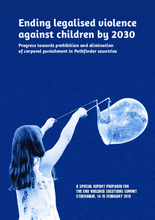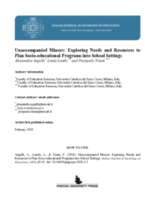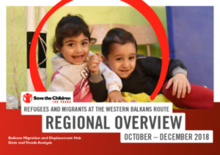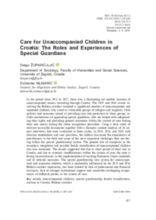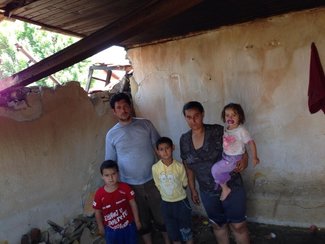

Displaying 281 - 290 of 544
This study aimed to test the impact of parents' evaluation of expectations on their child's behavioral problem by investigating a sequential mediation effect of parenting stress and parental satisfaction.
The present research aimed to describe and compare three new second-level intervention models to improve the care of unaccompanied migrant minors in Italy.
Prepared for the Agenda 2030 for Children: End Violence Solutions Summit, held in Stockholm, Sweden, on 14-15 February 2018, this report tracks progress towards prohibition and elimination of corporal punishment of children in Pathfinding countries.
The focus of this paper is an evaluation of educational projects which have been designed and operated for the reception of unaccompanied minors in a series of Italian schools.
The 2017 country factsheets provide an update on the status of child protection and care reforms from 16 European countries that are the focus of Opening Doors for Europe’s Children campaign in Phase II.
The present study concerning domestic adoption explored the adjustment of 37 adolescents and 22 emerging adults (with age ranging between 11 and 18 and 18 and 24 years, respectively), adopted through an Italian form of open adoption, and analyzed the quality of adoptive family relationships and adoptees' attachment as possible moderating variables in the relation between multiple pre-adoptive risk factors and adoptees' outcomes.
As part of the "Children Come First: Intervention at the border" project, Save the Children Italy elaborates and disseminates, on a quarterly basis, a dossier containing quantitative and qualitative information (profiles) relating to migrant minors entering Italy. This dossier contains information relating to the last quarter of 2017.
Data and Trend Analysis (DATA) Refugees and Migrants at the Western Balkans Route Regional Overview, covering period October - December 2018, describes key trends in migrations in the region, detailing information about the number of people on the move, demography (age, sex, country of origin, etc), behavioral patterns, and routes in use - with a focus on children, particularly unaccompanied children. Data in this report includes key trends in Bulgaria, North Macedonia, Serbia, Albania, Montenegro, Bosnia and Herzegovina, and Croatia.
Special guardians have been tasked with safeguarding the rights of unaccompanied minors in Croatia and providing general assistance within the system of care during their stay and/or during the status recognition procedure. The authors of this study discussed the experiences of practitioners in the field and some of the most important challenges they are facing within the special guardianship system.
The goal of the research is to gain insight into the challenges of foster care for children with behavioral problems from the perspective of experts and their suggestions for improving foster care, with the purpose of identifying guidelines for the development of specialized foster care and protecting the welfare of children with behavioral problems.

